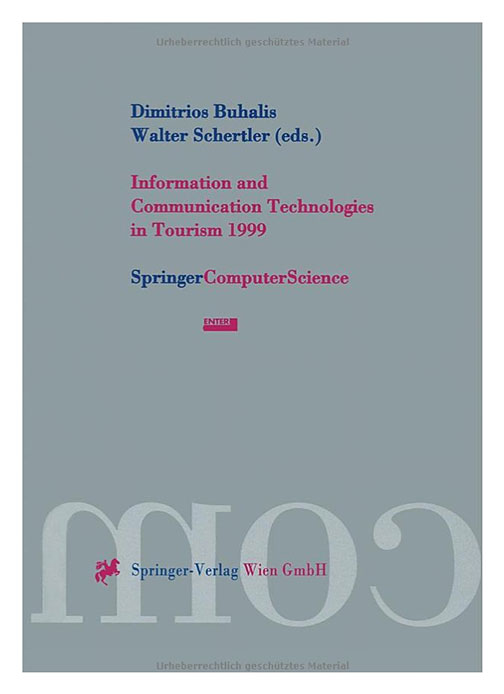
Information and Communication Technologies in tourism, ENTER’99
Buhalis, D., and Schertler, W., 1999,Information and Communication Technologies in tourism, ENTER’99, Springer-Verlag, Wien-New York, ISBN3211832580.
Information and Communication Technologies in Tourism 1999
Proceedings of the International Conference in Innsbruck, Austria, 1999
Buhalis, Dimitrios; Schertler, Walter (Eds.) 1999, XII, 407 p. 66 illus., Softcover, ISBN: 978-3-211-83258-5
Within the last six years the conference ENTER (International Conference on Information and Communication Technologies in Tourism) united various experts – practitioners as well as researchers – to exchange their experiences, ideas and visions in the sector of tourism and information technology (IT). The proceedings of the conference provide an international platform to discuss the topical situation and future trends, and the possibilities to shape the own strategies. The following topics are treated in this year’s volume: – knowledge management in tourism – changing consumer behaviour through information technology – using IT to support consumer choice and skills – engineering tourism applications – the empowerment of small and medium-sized enterprises through IT – using IT for hospitality management – using IT to redesign travel distributions and destination marketing systems and IT developments The emphasis of this year’s contributions lies on the strategic components more than on the technical issues.
Content Level » Research
Keywords » Tourism – Tourism Information Systems – Tourismus -Tourismusinformationssysteme
Related subjects » Business Information Systems – Database Management & Information Retrieval – Information Systems and Applications
TABLE OF CONTENTS
Tichler, G., Werthner, H., Grossman, W.: Using Data Mining in Analysing Local Tourism Patterns
Go, F., Govers, R., Heuvel, M.: Towards Interactive Tourism: Capitalising on Virtual and Physical Value Chains
Schertler, W., Berger-Koch, C.: Tourism as an Information Business: The Strategic Consequences of E-Commerce in Tourism for Business Travel
Robledo, M. A.: Database Marketing as a Source of Competitive Advantage for the Hotel Industry
Van der Pijl, J., Bartelink, H.: Printing on Demand as a New Channel for Tourist Information
Björk, P., Guss, T.: Internet as a Marketspace: The Perception of the Consumers
Dellaert, B. G. C.: The Tourist as Value Creator on the Internet
Curry, P., Alpert, F.: The Impact of the Internet on Consideration Sets: The Case of International Tourism Destinations
Beirne, E., Curry, P.: The Impact of the Internet on the Information Search Process and Tourism Decision Making
Jung, H.-S.: The Analysis of Demographic Profiles and Prospects of Internet Users in National Tourism Organisations: Case Study (Korean National Tourism Organisation)
Pröll, B., Retschitzegger, W. , Wagner, R. R.: Holiday Packages on the Web
Jung, H.-S., Twigeri, A.: The Use of the Internet as a New Marketing Tool to Promote New Tourist Destinations in Asia: Case Study (Korean National Tourism Organisation)
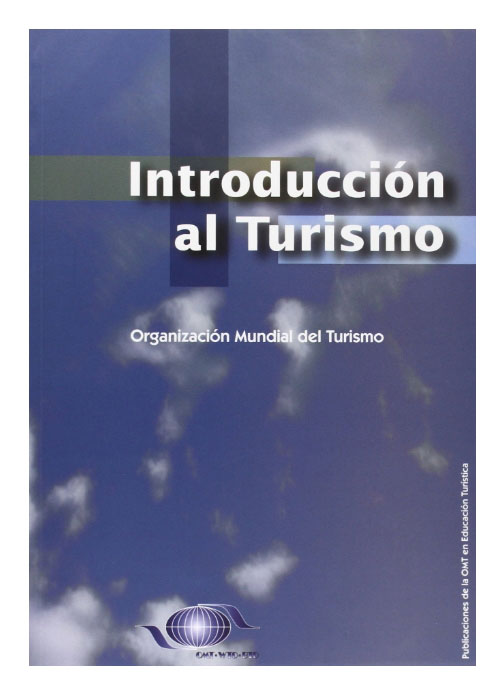
Introduccion al Turismo
Sancho-Perez, A., 1998,Introduccion al Turismo: Distance learning manual,World Tourism Organisation, Madrid Spain, in Spanish, (Principal Contributor).
Abstract
Table of Contents
- El turismo como actividad económica
- Turismo: concepto y definiciones
- Concepto y tipologías de la demanda turística
- Oferta turística
- Transporte
- Atracciones: Turismo temático
- Distribución en el turismo
- Necesidad de intervención pública en el mercado turístico
- Planificación y desarrollo de los destinos turísticos
- Competitividad en el turismo
- Impactos económicos del turismo
- Impactos socioculturales del turismo
- Impactos medioambientales del turismo
- Turismo sostenible
- Introducción al marketing en la industria turística
- El marketing Mix
- Tecnologías de la información en la industria turística
- Gestión de la calidad total en la industria turística
- Cualidades requeridas para ser un profesional del turismo
- Principales tendencias actuales en la industria turística
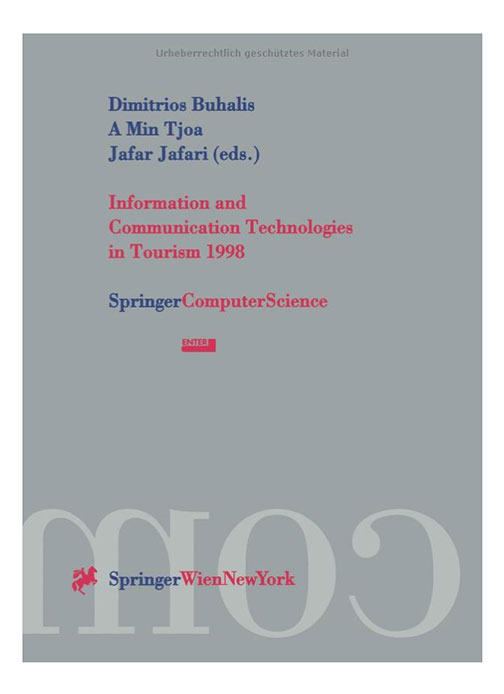
Information and Communication Technologies in Tourism ENTER98
Buhalis, D., Tjoa A.M. and Jafari, J. 1998,Information and Communication Technologies in tourism ENTER’98 Springer-Verlag, Wien, ISBN 321183088X.
ENTER98 conference proceedings
Information and Telecommunication Technologies increasingly propel the tourism industry and have become one of the most important determinants of the competitiveness for both the public and the private sectors. It is quite evident that tourism organisations which fail to take advantage of the emergent opportunities introduced by technology will lose considerable market share and suffer strategic disadvantages. Business processes re-engineering is essential therefore throughout the tourism industry. Encouragingly tourism organisations respond to the challenges and a large number of principals use technology in both operational and strategic functions. However, technology threatens traditional distribution channels with disintermediation. Non-tourism organisations also take advantage of the technological developments and launch services for tourism consumers and suppliers, increasing the competition for traditional operators. The tourism industry, therefore, emerges as a very dynamic one and prospects are really exciting for professionals and researchers. Ultimately virtual enterprises will dominate the tourism industry. They will produce cost-effective, instantaneous, mass-customised goods and services; develop dynamic interfaces with suppliers and consumers; and constantly reform their structures in order to satisfy consumer needs. They will also take advantage of lean and flexible organisational frameworks; advanced technology; interactive and innovative marketing and management; rapid reaction to market requests; as well as effective networking and partnerships in order to provide more benefits for all stakeholders. ENTER adopted a consistent scientific approach to the study of tourism and technology. Over the last five years it brought together practitioners and researchers of both tourism and information technology.
Paperback: 344 pages
Publisher: Springer Verlag GmbH (31 Jan 1998)
Language English
ISBN-10: 321183088X
ISBN-13: 978-3211830888
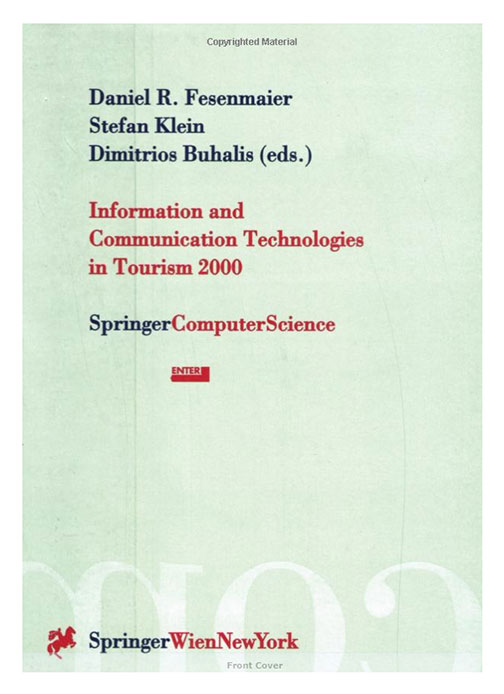
Information & Communication Technologies in tourism,ENTER’2000
Fesenmaier D., Klein, S., and Buhalis, D., 2000, Information & Communication Technologies in tourism,ENTER’2000, Springer-Verlag, Wien-New York, ISBN 3211834834. http://goo.gl/95F830
ENTER 2000 proceedings on Information and Communication Technologies
ENTER has now met for six years, providing a valuable forum for researchers and practitioners to discuss and debate their ideas and perspectives regarding the nature and role of tourism and information technology in global society. Over the years, the nature and rate of change in the tourism industry has been overwhelming. The internet and related technologies are now dominant agents of change and have created a “new economy” which requires new processes and strategies to replace those developed for the “old economy”. The theme of ENTER 2000, “Keeping Pace with Change – New Frontiers for IT and Tourism”, captures the challenges that we face at the beginning of the new millennium. The papers included in this volume illustrate the incredible growth in research and development in this area and reflect its youth, vitality and at the same time, maturation. Perhaps most important, these papers document how this new technology has changed and, in tum, how the industry has responded. The series of proceedings of which this volume is a part is creating a unique body of knowledge about the intertwined emergence of tourism and technology. There are, perhaps, three overriding themes of this congress. First is the focus on the tourist. Professor Stock’s keynote address “Intelligent Interfaces for the Tourist” is a good representative of a series of papers discussing how information systems, electronic markets, and user interfaces have been or can be developed to enhance the tourist experience.
Paperback: 518 pages
Publisher: Springer; 1 edition (May 19, 2000)
Language: English
ISBN-10: 3211834834
ISBN-13: 978-3211834831
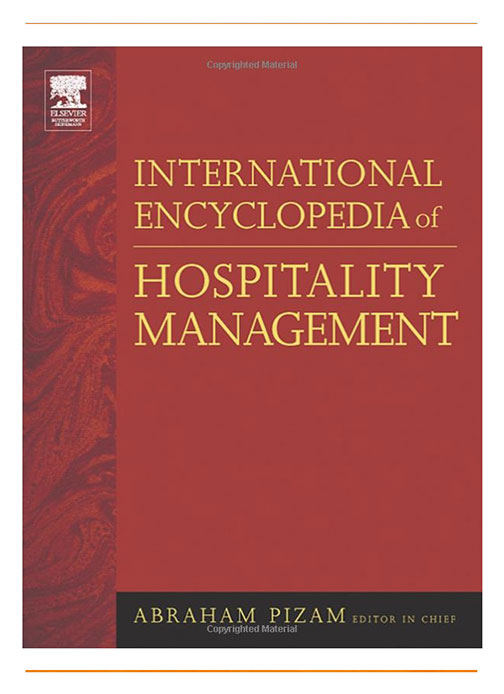
The Encyclopaedia of Hospitality
Pizam, A., 2005,The Encyclopaedia of Hospitality,Butterworth-Heinemann, Oxford. (ICT Section Editor) ISBN: 0750659963 http://goo.gl/6S4iaE
Editor Abraham Pizam, Dean & Linda Chapin Eminent Scholar; Chair in Tourism Management, Rosen College of Hospitality Management, University of Central Florida, USA
The International Encyclopedia of Hospitality Management covers all of the relevant issues in the field of hospitality management from both a sectoral level: * Lodging * Restaurants * Clubs * Time-share * Conventions As well as a functional one: * Accounting & finance * Marketing * Human resources * Information technology * Facilities management Its unique user-friendly structure enables readers to find exactly the information they require at a glance; whether they require broad detail which takes a more cross-sectional view across each subject field, or more focussed information which looks closely at specific topics and issues within the hospitality industry today. Section Editors: Peter Harris – ACCOUNTING & FINANCE Oxford Brookes University, UK Zheng Gu – ACCOUNTING & FINANCE University of Nevada, Las Vegas, USA Randall Upchurch – CLUB MANAGEMENT & TIMESHARE MANAGEMENT University of Central Florida, USA Patti Shock – EVENT MANAGEMENT University of Nevada, Las Vegas, USA Deborah Breiter – EVENT MANAGEMENT University of Central Florida, USA David Stipanuk – FACILITIES MANAGEMENT Cornell University, USA Darren Lee-Ross – HUMAN RESOURCES MANAGEMENT James Cook University, Australia Gill Maxwell – HUMAN RESOURCES MANAGEMENT Caledonian Glasgow University, UK Dimitrios Buhalis – INFORMATION TECHNOLOGY University of Surrey, UK Allan Stutts – LODGING MANAGEMENT American Intercontinental University, USA Stowe Shoemaker – MARKETING University of Houston, USA Linda Shea – MARKETING University of Massachusetts, USA Dennis Reynolds – RESTAURANTS & FOODSERVICE MANAGEMENT Washington State University, USA Arie Reichel – STRATEGIC MANAGEMENT Ben-Gurion University, Israel
Audience:
Primary: Libraries (faculty, site and departmental within universities and colleges, and special libraries within industry (professional trade & learned associations, management consultancy & information, & government bodies) Secondary: Academics, postgraduates and practitioners.
http://www.amazon.co.uk/dp/0750659963?tag=dimitbuhal-21&camp=1406&creative=6394&linkCode=as1&creativeASIN=0750659963&adid=0CDVXJZEBTY8KD4BP9C4&
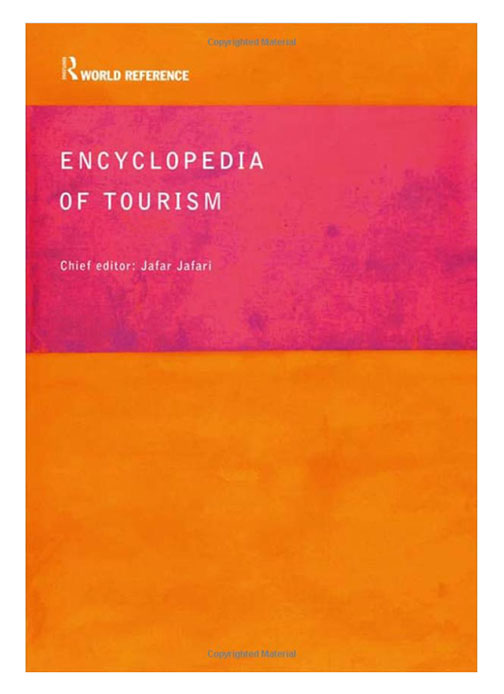
Encyclopedia of Tourism
Jafari, J., (ed) 2000, The Encyclopaedia of tourism,Routledge, London. ISBN 0415154057 (Dimitrios Buhalis Associate Editor for Technology). http://goo.gl/SYm3lH
In fewer than three hundred years tourism has become a global service industry of great economic, cultural and political importance. Published to critical acclaim, the Encyclopedia of Tourism – now available as a Routledge World Reference title – is the definitive one-volume reference source to this challenging multisectoral industry and multi disciplinary field of study.
Comprising over one thousand entries, this volume has been written by an international team of contributors to provide a comprehensive guide to both the manifest and hidden dimensions of tourism. It explores the wide range of definitions, concepts, perspectives and institutions and includes:
- comprehensive coverage of key issues and concepts
- definitions of all terms and acronyms
- entries on the significant institutions, associations and journals in the field
- country-specific tourism profiles, from Greece to Japan and Kenya to Peru
- thorough analysis of the trends and patterns of tourism development and growth.
The extensive cross-referencing and comprehensive index will assist the reader in making links between the diverse aspects of tourism studies, and the suggestions for further reading are inva

eTourism in Mandarin
Buhalis, D., 2004, eTourism: tourism information Technology for Strategic Management , Translated to Mandarin, Tourism Education Press China ISBN 7563712062
| 作 者: | 布哈里斯 | ||
| 出 版 社: | 旅游教育出版社 本社特价书 | ||
| 条 形 码: | 9787563712069 ; 978-7-5637-1206-9 | ||
| I S B N : | 7563712062 | 出版时间: | 2004-7-1 |
| 开 本: | 小16开 | 页 数: | 379 |
| 定 价: | 42 元 | ||
Tourism e-commerce
| Author: | Buha Rees | |||||
|---|---|---|---|---|---|---|
| I S B N: | 7563712062 | |||||
| Number of pages: | 379 | |||||
| Open the: | 16 mo | |||||
| Cover the form: | Paperback | |||||
| Press: | Tourism Education Press Society Jiashu | |||||
| Publication date: | 2004-7-1 | |||||
| Pricing: | 42 yuan | |||||
| Now selling price: | 37.0 yuan (1 Star Member Price 88% off) 36.5 yuan (two star member price 87% off) 35.7 yuan (3 star member price 85% off) | |||||
Tourism e-commerce Introduction
Tourism e-commerce book catalog
Chapter 1 Information and Communication Technology: Development and Change
Learning Objectives Chapter
1.1 Introduction
1.2 Definitions of information communication technology, information systems, information management and its relationship
stage of development of information communication described 1.3
1.4 Information and Communication Technology and the new enterprise tools
1.5 networks and information superhighway: the Internet, intranet and extranet
centralized information and communications technology, the development of new technologies 1.6
1.7 new wave of technological revolution
1.8 Conclusions
This chapter questions
the construction of reading material
related websites
in Chapter 2 of the significance of information communication technology revolution in corporate and strategic
learning objectives of this chapter
2.1 Introduction
2.2 for enterprises and strategic significance of
the impact of information and communication of information society technology revolution 2.3
2.4 Value Chain and Information impact of communication technology,
information technology market 2.5 development, e-commerce and Internet market
2.6 Strategic Management and Competitive Advantage
2.7 information communication technology, strategic management and competitive
2.8 precondition to achieve competitive advantage through IT
……
Chapter 3 e-tourism: dynamic information communication technology and tourism combined with
electronic travel demand-driven Chapter 4
Chapter 5 supply-driven e-tourism
portal for tourism business through the second part of the information technology strategy and operations experts,
e-tourism in Chapter 6 operational management and distribution
of electronic airline Chapter 7
Chapter 8 electronic hotel
Chapter 9 Electronic Travel
Chapter 10 electronic travel agents
Chapter 11 electronic destination
Chapter 12 e-tourism: Overview and Future Prospects

Global Managing alliances in the Tourism and Hospitality Management
Crotts, J., Buhalis, D., and March R., (eds), 2000, Global Managing alliances in the Tourism and Hospitality Management, The Haworth Press, New York, ISBN 0789008181
Target your business strategies to fit specific tourist cultures!
Since Thomas Cook packaged the first tour in 1841, hospitality and tourism enterprises have forged long-term alliances with one another. Yet research suggests that most such alliances will fail. What goes wrong? How can tourism professionals take advantage of all the benefits of international cooperation while minimizing the potentially disastrous risks of failure? Global Alliances in Tourism and Hospitality Management provides empirical research, case studies, and theory to help you make the right decisions about this potentially high-profit strategy.
To compete in the world travel market, a firm must increase its ability to reach, serve, and satisfy its target markets, while lowering costs. Making an alliance is often the most efficient and effective way to reach these twin goals. However, many firms make alliances without sufficient planning and end up paying the price in failed tours, dissatisfied customers, and damaged reputation. The five critical questions that must be answered before creating a partnership include:
- Do we want to partner?
- Do we have an ability to partner?
- With whom do we partner?
- How do we partner?
- How do we sustain and renew a partnership over time?Global Alliances in Tourism and Hospitality Management offers specific, detailed ideas and research on vital topics, including:
- deciding how and when to form alliances
- handling multicultural management issues
- identifying the basic elements of successful–and not so successful–partnerships
- discovering the effects of culture on purchasing decisions
- dealing with conflicts within alliances
- ensuring cross-agency cooperationThe development and management of alliances is a critical skill. Global Alliances in Tourism and Hospitality Management provides you with the strategies you need to build successful alliances. International in scope, this informative guide will help marketers, managers, and other professionals in the hospitality industry to lower company costs, raise profits, and gain strategic advantages in diversified markets.
Paperback: 178 pages
Publisher: Haworth Press Inc (1 Mar 2000)
Language English
ISBN-10: 0789008181
ISBN-13: 978-0789008

Tourism Business Frontiers
Buhalis, D., and Costa, C., (eds), 2005,Tourism Business Frontiers Butterworth Heinemann ISBN: 0750663774 http://goo.gl/uv1V6a
By
Dimitrios Buhalis, Established Chair in Tourism, School of Services Management, Bournemouth University, UK
Carlos Costa, University of Aveiro, Portugal
As the global tourism industry continues to expand and to become more complex, it is vital that those in the industry are equipped with a thorough knowledge of all topics involved. New Tourism Consumers Products and Industry: Present and Future Issues provides this comprehensive coverage and more. Written by a team of globally renowned thinkers and researchers, it not only provides a brief historical overview of tourism, but delves deeper, to discuss emerging trends, consumer types and looks at the way the industry itself is changing and developing. It provides the manager of tomorrow with the ability to look beyond normal planning horizons and identify potential opportunities from these changes. New Tourism Consumers Products and Industry: Present and Future Issues is part of a two part set with its companion text, Tourism Dynamics, Challenges and Tools: Present and Future Issues which takes the reader on a logical progression to look at issues relating to the external environment in which the tourism industry functions. Both texts thereby provide the reader with a complete set of tools and knowledge recognise the key areas of growth and change, and the ability to use the new tools and technologies available to develop them and maximise business potential.
Audience:
Level 3 and postgraduate degree courses in tourism. Senior university level synthesis courses which are commonly provided as core or elective class in most specialised tourism programmes and first year introductory graduate classes. Libraries and industry practitioners.
CONTENT: Preface. Forward. Contents, Buhalis-Costa and Jean-Claude Baumgarten. Tourism Futures: Introduction, Dimitrios Buhalis and Carlos Costa. The transformation of Consumer Behaviour, Ulrike Gretzel, Daniel R. Fesenmaier and Joseph T. O’Leary. New and emerging markets, Chris Cooper and Noel Scott (UQ) and John Kester (WTO). Third Age tourism, Gianna Moscardo. Youth and adventure tourism, Greg Richards & Julie Wilson. Domestic and Visiting Friends and Relatives Tourism, Philip Pearce and Gianna Moscardo. CONFERENCE TOURISM – MICE Market and Business tourism, Adele Ladkin. Alternative tourism and the moralisation of tourism, Jim Butcher. Reengineering established products & destinations, Dimitris Ioannides. Urbanisation and second homes tourism, Aurora Pedro. Fashion and accessibility based emerging destinations, Mike Hall and Dick Butler. Experience based products, Antti Hahti and Raija Komppula. Nature based products, Ecotourism and Adventure tourism, Tanja Mihalic. Sport and events tourism, Paul de Knop. Shopping and tourism, Yvette Reisinger .Gastronomy, Food & Wine, Mike Hall and Richard Mitchell. New Age Travel/Tourism: spiritual experiences, Yvette Reisinger. Space Tourism, Vaios Lappas. Intermediaries: Travel Agencies & Tour Operators, Dimitrios Buhalis and Dorota Ujma. Transport and transit: Air, Land and Sea, Anne Graham. Hospitality Megatrends, Peter Jones. Attractions Megatrends, Pierrre Benckendorff. Culture, Heritage and Visiting Attractions, Bob McKercher and Hilary du Cros. Entertainment and new leisure, Melanie Smith. Destination Management Organisations and Actors, Mara Manente and Valeria Minghetti. Tourism Futures: Conclusions, Carlos Costa and Dimitrios Buhalis.

Tourism Management Dynamics
Buhalis, D., and Costa, C., (eds), 2005,Tourism Management Dynamics Butterworth Heinemann ISBN-10: 0750663782 http://goo.gl/EfGbhH
By
Dimitrios Buhalis, Established Chair in Tourism, School of Services Management, Bournemouth University, UK
Carlos Costa, University of Aveiro, Portugal
As the global tourism industry continues to expand and to become more complex, it is vital that those in the industry identify trends early and design proactive strategies to gain competitive advantage. Tourism Futures: dynamics, challenges and tools provides the readers with a comprehensive insight of the changes in the external business environment, and equips them with new managerial techniques and tools in order to adapt and profit from these changes and into the future. Written by a team of globally renowned thinkers and researchers, it provides the manager of tomorrow with the ability to look beyond normal planning horizons and identify potential opportunities from change. Tourism Futures: dynamics, challenges and tools is part of a two part set with its companion text, Tourism Futures: the emerging business which takes the reader on a logical progression to look at new products, new consumers and new industry. Both texts thereby provide the reader with a complete set of tools and knowledge to enable them to recognise the key areas of growth and change, and the ability to use the new tools and technologies available to develop them and maximise business potential.
Audience:
Level 3 and postgraduate degree courses in tourism. Senior university level synthesis courses which are commonly provided as core or elective class in most specialised tourism programmes and first year introductory graduate classes. Libraries and industry practitioners.
CONTENT: Preface, Jean-Claude Baumgarten. Tourism Futures: Introduction, Dimitrios Buhalis and Carlos Costa. Demographics, Mike Hall. Safety and Security and World Peace, Dallen Timothy. Crisis management and tourism, Tony Tse. Climate Change, David Viner & Sarah Nicholls. Monitoring as an Approach to Sustainable Tourism, Graham Miller and Louise Twinning-Ward. Media and communications, Rok Klancnik @ WTO. Liberalisation and deregulation for tourism, Andreas Papatheodorou. Research: New approaches and knowledge creation, Mike Riley and Edit Szivas. Organisations and Management in the future, Colin Hales. Innovation, Creativity and competitiveness, Peter Burns. Chaos theory and managerial approaches, Roslyn Russell. SMEs in Tourism, Mike Peters and Dimitrios Buhalis. The Future of Work and Employment in Tourism, Tom Baum. Managing Globalisation, Frank Go and Erik van ‘t Klooster. Resource Management: social, cultural, physical environment and the optimisation of impacts, Telfer and Hashimoto. Policy -related Networks and Partnerships in Tourism Destinations, Bill Bramwell. Destination based business Networks and Partnerships, Dr. Tazim Jamal and Dr. Ute Jamrozy. Consumer Centric Tourism Marketing, Outi Niininen and Roger March and Dimitrios Buhalis. Cross-Cultural Hospitality & Tourism Marketing, Po-Ju Chen and Abraham Pizam. Information Communication Technologies, Buhalis and O’Connor. Tourism Marketing Information System Decision Support for the Tourism Manager, Karl Woeber. Forecasting methodologies for Tourism, Li, G Haiyan Song and Witt S. Managing Economic Impacts, Satellite Accounts and Observatories, Antonio Massieu. Planning, development and the territory, Carlos Costa. Tourism Futures: Conclusions, Carlos Costa and Dimitrios Buhalis.
